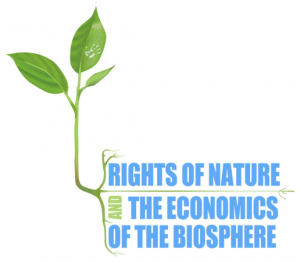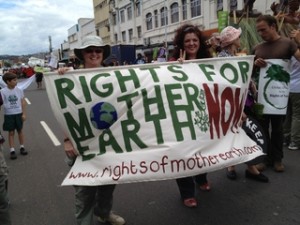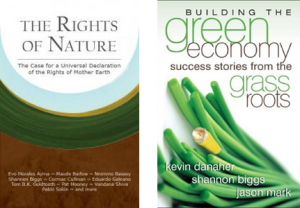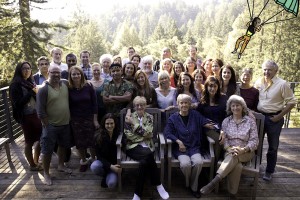 The majority of the world’s economies are based on the idea that nature
The majority of the world’s economies are based on the idea that nature
is property and most legal systems put real power behind the idea that nature is a “thing” separate and apart from humans, here only to serve our needs and whimsical desires. To accept the current structure of law and economy is to accept that the human relationship with the natural world is one of ownership, and promotes unfettered exploitation of the earth’s natural systems by humans. This is our current story.
So, how do we change this story? By recognizing that nature has rights.
Recognizing the Rights of Nature is a potentially powerful tool for protecting the planet. Rather than treating nature as property, Rights of Nature acknowledges that nature in all its life forms has the right to “exist, persist, maintain and regenerate its vital cycle.”
In the last few years, we have partnered with the Council of Canadians, and Fundacion Pachamama to release a report and a book gathering the stories and thoughts of leaders in the environmental movement as they discussed the paradigm-shifting approach to legislating resource use called the Rights of Nature, and the need to broaden legal frameworks to recognize ecological limits, natural laws, and the interdependency of all life.
Although these environmental leaders gathered at international conferences, contributed to these reports, and conversations about the Rights of Nature spread, these big thinkers had yet to sit down together to assess the current story and figure out how to take the Rights of Nature story to the next level in all of our environmental and social justice work.
So came the 2013 Rights of Nature and the Economics of the Biosphere bringing together more than 50 international, national, and local visionaries, thinkers, and activists from across the globe at the Stillheart Institute in Woodside, California over a four day period.
The Summit aimed to get these leaders from various disciplines to foster a deeper understanding of the Rights of Nature framework, to explore strategies for global movement building, and perhaps, most importantly, to forge new collaborations and campaigns and a revolutionary new path for safeguarding our planet.
The first half of the Summit tackled the international organizing around the Rights of Nature. On hand were Maude Barlow from the Council of Canadians, Pablo Solón from Focus on the Global South, Jeff Conant from Friends of the Earth, Gopal Dayaneni from Movement Generation, Tom Goldtooth from the Indigenous Environmental Network, and many more.
A range of topics were discussed beginning with finding common ground in everyone’s work and looking at the big picture of where we want to go from here, followed by looking at the relationship of indigenous rights and rights of nature, then looking at the financialization of nature and the threats associated with it.
 The second half of the Summit sought to build bridges between organizations from throughout the Bay Area, a vision of organizing around a local biosphere by bringing together the individuals pushing for solar panels on rooftops with the people linking arms in front of the Chevron refinery in Richmond to organize around common principles based on the rights of nature. Global Exchange was proud to welcome Geogia Kelly from the Praxis Peace Institute, Osprey Orielle Lake of the Women’s Earth and Climate Caucus, Marco Vangelisti from SLOW Money, and many more.
The second half of the Summit sought to build bridges between organizations from throughout the Bay Area, a vision of organizing around a local biosphere by bringing together the individuals pushing for solar panels on rooftops with the people linking arms in front of the Chevron refinery in Richmond to organize around common principles based on the rights of nature. Global Exchange was proud to welcome Geogia Kelly from the Praxis Peace Institute, Osprey Orielle Lake of the Women’s Earth and Climate Caucus, Marco Vangelisti from SLOW Money, and many more.
Plans were put into place to figure out how to move the Rights of Nature framework forward into the mainstream and how to integrate this concept into our everyday work. Those in attendance worked together to draft a radical declaration that challenges capitalism and the structures that are destroying our world, and that calls for recognizing Rights of Nature as an essential way forward for humanity. We will continue to update you on the progress of this declaration as the final version is being drafted.
The consensus at the end of the summit was clear: Rights of Nature provides an exciting new way to draw together disparate strands of activism, and offers a new organizing energy for all of our work as we rewrite our human story.
SUPPORT THIS WORK
 With the Summit over, we are turning to you to help us further our Rights of Nature work. Your donation will help us take the work of the Rights of Nature Summit to the next level and advance Rights of Nature as a real solution to the growing corporate-driven environmental and climate crises. A few dollars will go a long way.
With the Summit over, we are turning to you to help us further our Rights of Nature work. Your donation will help us take the work of the Rights of Nature Summit to the next level and advance Rights of Nature as a real solution to the growing corporate-driven environmental and climate crises. A few dollars will go a long way.
We hope you’ll join us and donate $5 today. Donate $20 or more and receive the choice of one of two books: The Rights of Nature: The Case for a Universal Declaration of the Rights of Mother Earth or Building the Green Economy: Success Stories from the Grassroots. Get your copy today.

